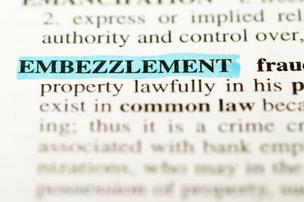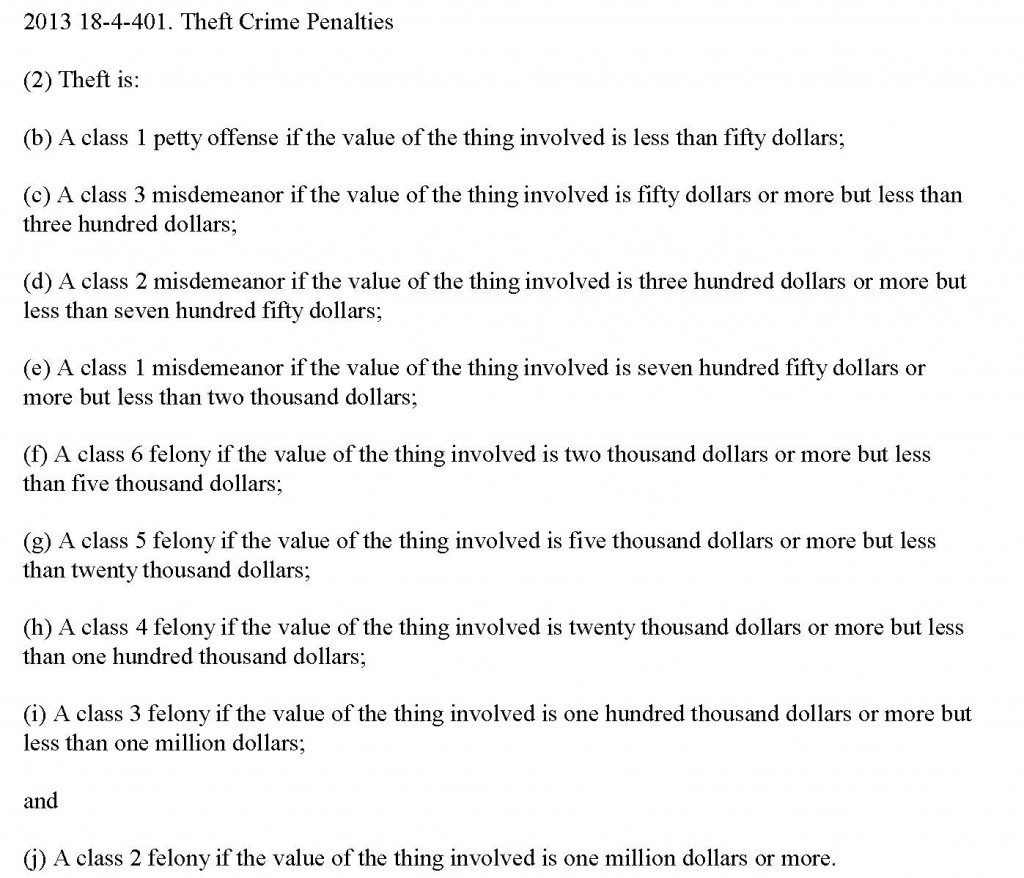Understanding The Colorado Laws Of Embezzlement, Theft and Larceny Part I of II
By H. Michael Steinberg – Colorado Theft Crimes Criminal Defense Lawyer- Attorney
Understanding The Colorado Laws Of Embezzlement, Theft and Larceny requires you to analyze just how an embezzlement case is different than other forms of Colorado theft crimes. While there is not specific charge enumerated as “embezzlement,” the label of embezzler is used by Colorado prosecutors to enhance the seriousness of the sentence. Embezzlement means a violation of trust that – the DA will argue – should be punished more harshly than “standard” theft cases.
Embezzlement in Colorado – The History Behind Embezzlement In Colorado
At one point Embezzlement and theft were separate crimes in Colorado. Today they are subsumed under CRS 18-4-401. But the history behind the crime is important. The nature of the embezzlement crime is a violation of trust. Embezzlement is charged when someone – entrusted to manage or monitor someone else’s money or property – appropriates (steals) that money or property. The original access to the stolen money or property is authorized as a matter of trust – and the stealing of the money or property is not only a crime – it is moral violation of that special position of trust. It is for that reason that this theft crime is called “embezzlement” and not merely theft.
While the crime of theft in Colorado is almost always charged under 18-4-401, and there are no longer any distinctions between theft and embezzlement – (the value of the items stolen determines the range punishment for the crime) – during the plea bargaining and sentencing phase of the case – the violation of trust theme is often heard as a matter in aggravation calling for more punitive sanctions.Theft is defined under the Colorado law – C.R.S. 18-4-401 – when a person:
….knowingly obtains or exercises control over anything of value of another without authorization, or by threat or deception, intends to deprive the other person permanently of the use or benefit of the thing of value; knowingly uses, conceals, or abandons the thing of value in such manner as to deprive the other person permanently of its use or benefit; or uses, conceals, or abandons the thing of value intending that such use, concealment, or abandonment will deprive the other person permanently of its use and benefit; demands any consideration to which he is not legally entitled as a condition of restoring the thing of value to the other person.
The Trust “Factor” As An Aggravator In Colorado Embezzlement Cases
Understanding the nature of the prosecution of embezzlement cases in Colorado requires a close look at the different kinds of theft. A theft can be a robbery or a form of fraud or it can be theft from an employer or a client – when it is the latter it is an embezzlement.
Aggravating Factors – Such As Theft From The Elderly Or Other “At Risk” Victims
Colorado lowers the theft threshold theft amounts and imposes much harsher penalties when the defendant has allegedly embezzled from a “specially protected class of victims” (such as elderly or disabled adults). This also applies when there is a heightened position of trust with the victim.
The Special Victims – Embezzlement and Enhanced Sentencing For “At Risk” Victims
While you might consider embezzlement as the secret theft from one’s employer or client – today law enforcement has also specially targeted embezzlement from the trusted caretakers of our elderly population. Here is Colorado’s version of the At Risk Law.
18-6.5-103. Crimes against at-risk adults and at-risk juveniles – classifications
(1) Crimes against at-risk adults and at-risk juveniles shall be as prescribed in this section.
…..
(5) Any person who commits theft, and commits any element or portion of the offense in the presence of the victim, as such crime is described in section 18-4-401 (1), and the victim is an at-risk adult or an at-risk juvenile, or who commits theft against an at-risk adult or an at-risk juvenile while acting in a position of trust, whether or not in the presence of the victim, commits a class 5 felony if the value of the thing involved is less than five hundred dollars or a class 3 felony if the value of the thing involved is five hundred dollars or more. Theft from the person of an at-risk adult or an at-risk juvenile by means other than the use of force, threat, or intimidation is a class 4 felony without regard to the value of the thing taken.
(5.5) A person who commits theft, and commits any element or portion of the offense in the presence of the victim, as such crime is described in section 18-4-401 (1), and the victim is an at-risk elder, or who commits theft against an at-risk elder while acting in a position of trust, whether or not in the presence of the victim, or commits theft against an at-risk elder knowing the victim is an at-risk elder, whether in the presence of the victim or not, commits a class 5 felony if the value of the thing involved is less than five hundred dollars or a class 3 felony if the value of the thing involved is five hundred dollars or more. Theft from the person of an at-risk elder by means other than the use of force, threat, or intimidation is a class 4 felony without regard to the value of the thing taken.
Understanding The Colorado Laws Of Embezzlement, Theft and Larceny – Some Examples of Embezzlement
Some examples of a violation of the kind of trust you most often see in embezzlement cases would be a bank teller who is given legal access to the bank’s money and is trusted not to steal, officers and employees of corporations who take money or property belonging to the company, professionals such as lawyers or board members who are entrusted to care for a client’s or investor’s money and then secretly take that money .. ALL fit the embezzlement profile as does anyone in a position of trust over another’s money or property.
By definition then – embezzlers endeavor to conceal their activities. Embezzlement can also involve secretly hiding relatively small amounts of money over a very long period of time. On the other hand, there are the opportunists for “quick strikers” – those having access to very large sums of money at one time – who strike one time and then flee.
Finally, some embezzlers use schemes called Ponzi schemes promising very large unrealistic returns while stealing from one group of clients to pay other clients. The most recent high profile Ponzi scheme was the Bernie Madoff investment scandal which allegedly netted over $65 billion from some of the wealthiest and most savvy investors from all over the world.
Colorado Embezzlement Sentencing – How Is Embezzlement Punished in Colorado?
In Colorado, embezzlement is punished according to the value of the property or money stolen. (Colorado Rev. Stat. Ann. § 18-4-401.)
Colorado Theft Punishment Chart
An Experienced Colorado Defense Attorney For Your Colorado Embezzlement -Theft Case
One cannot place a value on the loss of your freedom, your reputation, your employment or for some, your reputation among your friends and your family. With the pressures of our tough economic times, good people can make bad decisions which lead to criminal charges and a threat that can quite possibly change your life forever. While at one time “white collar” crimes drew a slap on the writs – times have changed. Today serious, far-reaching consequences await the poorly handled Colorado embezzlement case.
An experienced Colorado criminal defense lawyer will build the best possible defense that begins with a thorough defense based investigation and end with years of legal knowledge of Colorado criminal law.
Whether you have the “scent” of an investigation – or you are already charged – get experienced legal counsel now. Failure to act quickly – pro-actively may result in possible jail or prison sentences, serious financial penalties or other punishments may cause the kind of irreparable damage to your life from which you may never recover.
Understanding The Colorado Laws Of Embezzlement, Theft and Larceny
ABOUT THE AUTHOR: H. Michael Steinberg – Email The Author – A Denver Colorado Theft Crimes Criminal Defense Lawyer – or call his office at 303-627-7777 during business hours – or call his cell if you cannot wait and need his immediate assistance – 720-220-2277.
If you are charged with A Colorado crime or you have questions about Understanding The Colorado Laws Of Embezzlement, Theft and Larceny, please call our office. The Law Offices of H. Michael Steinberg, in Denver, Colorado, provide criminal defense clients with effective, efficient, intelligent and strong legal advocacy. We can educate you and help you navigate the stressful and complex legal process related to your criminal defense issue.
H. Michael Steinberg, is a Denver, Colorado criminal defense lawyer with over 40 years of day to day courtroom experience – specializing in Colorado Criminal Law along the Front Range. He will provide you with a free initial case consultation to evaluate your legal issues and to answer your questions with an honest assessment of your options. Remember, it costs NOTHING to discuss your case. Call now for an immediate free phone consultation.
Helping Clients To Make Informed Decisions In the Defense of Colorado Criminal Cases.
Contact A Lawyer with Three Decades of Experience as a Denver Criminal Attorney at The Steinberg Colorado Criminal Defense Law Firm Today.
Colorado Defense Lawyer H. Michael Steinberg provides solid criminal defense for clients throughout the Front Range of Colorado – including the City and County courts of Adams County, Arapahoe County, City and County of Boulder, City and County of Broomfield, City and County of Denver, Douglas County, El Paso County – Colorado Springs, Gilpin County, Jefferson County, Larimer County, and Weld County,…. and all the other cities and counties of Colorado along the I-25 Corridor… on cases involving …Understanding The Colorado Laws Of Embezzlement, Theft and Larceny.

